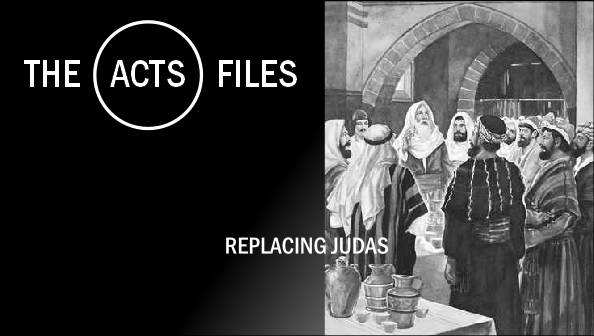By Tyson Thorne

Following the ascension, the disciples do as Jesus commanded (verse 4) and entered the city of Jerusalem to wait for the Holy Spirit to come upon them. There wait was not to be spent in idleness, however, there was much to do. The first order of business was a prayer meeting, a meeting for which there is a partial attendance record. I say “partial” because while it appears in verse 14 to be a private prayer time, we discover in verse 15 there were about 150 people. Wouldn’t it be grandiose if churches today could get 150 members to a prayer meeting? Also of interest is the presence of several women who, had this been a strictly Jewish affair, would have been kept separate from the men.
The most notable observation of this passage is how they prayed. All 150 of them prayed “with one mind”. In other words, they didn’t pray about their own problems or for friends and family, they didn’t pray for the overthrowing of the Roman government, they didn’t pray about local politics or personal finances, and certainly their prayer was not meandering. They prayed together, all of them, with one mind. What could possibly have concerned so many to stay so focused? The appointment of a disciple to replace Judas Iscariot.
Some churches today appoint their own apostles believing it to be an office of the church, an understanding that is misguided at best. Look at the requirements for being an apostle:
1. It had to be a man (notice Peter specifies “one of the men…”, verse 21)
2. He had to have been present during all of Christ’s earthly ministry, verse 21-.22
3. He had to have been present at the ascension of Jesus, verse 22
4. He had to be able to personally testify to the resurrection of Jesus, verse 22
I don’t know anyone at any church I’ve ever attended that fits the criteria, which brings us to an important point. So much happens in the book of Acts that is not normative for believers today. As exciting as the Acts of the Apostles were, we share in the same Spirit with them but not in the same experience. I can’t overstate how important this is to understand, because so many believers miss this point and end up striving for a life that they cannot attain in this time. We’ll speak to this more and more as we continue through the book.
Out of the 150 people present, only two men were qualified and nominated for the office, Justus and Matthias. Following the nominations they prayed again for God’s guidance and cast lots. Very little is known about this practice, despite its being mentioned nearly 80 times in the Bible. While it was common in Israel, used from its founding days (Joshua 14-21) and in the temple (1 Chronicles 24-29) and here in Acts we still don’t know what exactly was cast and how it was to be read. It may have been sticks of differing length (like drawing straws), flat stones that could be flipped like a coin, or something akin to dice. Again, if this passage is supposed to be normative for the church today, as some propose, why do not continue this tradition of determining God’s will? Indeed, why are we not instructed anywhere in the entire New Testament to keep this practice? Regardless of what it was and how it was interpreted, the lots indicated Matthias.
I don’t want to make the very mistake I’ve been railing against, but I do think there is much that churches could learn from this event. I have served as a teacher, an elder, and a pastor; I’ve been a part of more than one church plant and served on a pastoral search committee. In all that time and in all those capacities I’ve never seen such involvement in the choosing of church leadership. Not even when ordaining a new pastor.
If I could offer advice to the modern church based on this passage I would point out that, first, one should try to promote from within. If the church is feeding and discipling the way it should there should be many members capable of being promoted to pastor. If there isn’t, then the church has bigger problems than finding a new pastor, it needs to question the reason for its existence. Second, the process should involve as many people as possible in the congregation. Third, the process should be immersed in prayer. And finally, the process should be quick, taking a day or a week at most.
|
|
|
